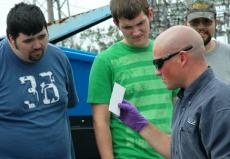Crime Scene Investigation students turn from TV to career, minor

(from left) Justin Riley, junior computer information science major, and Matthew Trumbore junior criminal justice major take direction from Tim Wilson, assistant professor of criminal justice as a car from a homicide case is processed for evidence. CSI majors learn the basics such as fingerprinting and collecting evidence.
Parents love to tell their kids that spending hours in front of the television will do them no good. Those kids must not have been watching crime shows. Otherwise, they might just be on their way to a rewarding career.
“I love crime shows,” said junior Criminal Justice Administration major Kayla Wagner. “I’ve always been a crime show buff.”
Wagner, who grew up in a family of police officers, has always had an interest in crime scene investigation. In her freshman year, Wagner found her niche.
“When I got started, it was something I was really good at doing,” she said. “I could wrap my head around the cases. How you have to think outside of normal thought to understand the concepts is really fun.”
Southern offers two CSI courses in order to achieve a minor degree. The first is an introduction to investigation, specifically dealing with theory, crime scene management and first responder duties. It also deals with basic evidence collection techniques, like finger printing and how to package evidence. It provides some hands-on training in what to do once the evidence is collected.
The second course gets into the more specific techniques of crime scene investigation. Students learn to use alternate light sources, super glue fuming, different ways to process finger prints, blood-stain analysis, and trajectory analysis. The second edition gets all the way up into trace evidence collection. Assistant professor Tim Wilson instructs the courses. Wilson has been a police officer for more than 10 years, and uses this to give his students first hand accounts of real-life crime scenes and field training.
“This gives students an opportunity who don’t necessarily want to be police officers, but want to work in criminal justice a chance to do that without actually walking the streets.”
He most recently worked on a pick-up truck that was used in the commission of a double homicide in Oklahoma.
“I was able to take one of my CSI classes over, and allow them to observe the processing of this vehicle,” said Wilson. “It was an excellent opportunity for these students to be able to look at these things that we see in class and see it being done in the real world.”
Even when the classes get into the gritty realities of rape, burglary, and murder, Wagner is not put off.
“Sometimes it gets a little morbid,” she said, “when we’re talking about shooting people and cutting off their heads. It’s a pretty informal class. But anybody who likes the CSI shows should come and see how it’s really done.”
Your donation will support the student journalists of Missouri Southern State University. Your contribution will allow us to purchase equipment and cover our annual website hosting costs.















